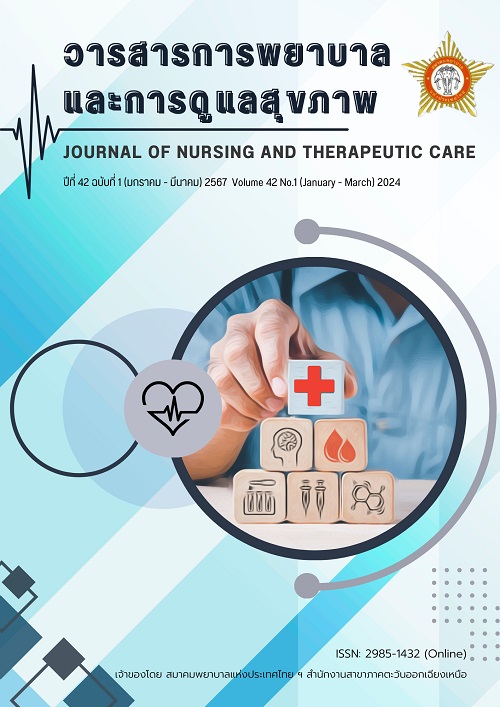ผลการใช้รูปแบบ “Smart kids by SEND STEP” ในการพัฒนาทักษะสมอง เด็กอายุ 2-6 ปี ในอำเภอราษีไศล จังหวัดศรีสะเกษ
คำสำคัญ:
ทักษะสมอง, พัฒนาการด้านการคิดเชิงบริหาร, เด็กปฐมวัยบทคัดย่อ
การวิจัยครั้งนี้เป็นการวิจัยเชิงปฏิบัติการ มีวัตถุประสงค์เพื่อศึกษาผลการใช้รูปแบบ “Smart kids by SEND STEP” ในการพัฒนาทักษะสมอง (Executive function) เด็กอายุ 2-6 ปี ในอำเภอราษีไศล จังหวัดศรีสะเกษ ขั้นตอนการศึกษาประกอบด้วย 1) การวางแผน (Plan) 2) การปฏิบัติ (Action) 3) สังเกตผล (Observe) 4) การสะท้อนผล (Reflect) คัดเลือกผู้เข้าร่วมวิจัยแบบเจาะจง 2 กลุ่ม ประกอบด้วย 1) กลุ่มตัวอย่างในการวิจัย เด็กอายุ 2-6 ปี ในศูนย์พัฒนาเด็กเล็ก จำนวน 26 คน และ2) ครูผู้ดูแลเด็กในศูนย์พัฒนาเด็กเล็กที่มีส่วนร่วม จำนวน 6 คน ศึกษาระหว่างเดือน พฤศจิกายน พ.ศ. 2565 – เมษายน พ.ศ. 2566 วิเคราะห์ข้อมูลเชิงคุณภาพใช้การวิเคราะห์เชิงเนื้อหาและวิเคราะห์ข้อมูลเชิงปริมาณ แบบประเมินการคิดเชิงบริหาร พัฒนาการความฉลาดทางอารมณ์ โภชนาการ โดยการแจกแจงความถี่ ค่าเฉลี่ย ร้อยละและส่วนเบี่ยงเบนมาตรฐานผลวิจัยพบว่า ศูนย์พัฒนาเด็กเล็กมีการใช้รูปแบบ“Smart kids by SEND STEP” ประกอบด้วย 1) S:SELF การส่งเสริมพัฒนาการด้านตัวตนของเด็ก 2) E: Executive function การส่งเสริมทักษะสมอง 9 ด้าน 3) N: Nutrition โภชนาการที่เหมาะสมตามวัย เน้น ยาเสริมธาตุเหล็กและไอโอดีน 4) D: Devolvement พัฒนาการ ด้าน ร่างกาย อารมณ์ สังคม สติปัญญา และ 5) S: SEND ระบบส่งต่อข้อมูลดูแลเด็กระหว่างครอบครัว ศูนย์พัฒนาเด็กเล็ก และเจ้าหน้าที่สาธารณสุข พบว่าหลังใช้รูปแบบครูมีความมั่นใจในการจัดทำแผนส่งเสริมทักษะสมองและใช้แผนในการทำกิจกรรมกับเด็กมากขึ้น เด็กปฐมวัยกลุ่มตัวอย่าง มีคะแนนพัฒนาการด้านการคิดเชิงบริหารเพิ่มขึ้น ร้อยละ 42.31 ความฉลาดทางอารมณ์เพิ่มขึ้นร้อยละ 76.92
มีภาวะโภชนาการตามเกณฑ์ร้อยละ 73.08 มีพัฒนาการสมวัยร้อยละ 96.15 ครูมีความพึงพอใจรูปแบบในระดับพึงพอใจมาก รูปแบบ “Smart kids by SEND STEP” สามารถเพิ่มทักษะทางสมอง ความฉลาดทางอารมณ์ สร้างความมั่นใจให้ครูในการส่งเสริมทักษะสมองและมีการนำรูปแบบนี้ไปใช้ในศูนย์พัฒนาเด็กเล็กทุกแห่ง
Downloads
เอกสารอ้างอิง
Ministry of Public Health. Manual for monitoring and promoting early childhood development. Developmental Surveillance and Promotion Manual (DSPM). 1st ed. Nonthaburi: Office of Printing Affairs of the War Veterans Organization; 2019. (in Thai)
Ministry of Public Health. Health Data Center (HDC) Program, Ministry of Public Health. [Internet] 2022. [Cited 2022 Oct 25 ]. Available from: https://hdcservice.moph.go.th/hdc/index.php. (in Thai)
Rajanukul Institute Department of Mental Health. Moves forward to raise Thai children with good IQ. Survey of the intelligence level situation (IQ) and Emotional Intelligence (EQ) Thai children in Grade 1, year 2021. [Internet] 2014. [Cited 2022 Oct 13 ]. Available from: https://th.rajanukul.go.th/. (in Thai)
National Institute for Child and Family Development Mahidol University. Basic knowledge about EF skills for teenagers. [Internet] 2022. [Cited 2022 Oct 17 ]. Available from: https://muef-teenager.com/pdf/content_for_ef.pdf (in Thai)
Hanmethee S. EF Brain skills to manage life successfully and survive in a world of uncertainty (Executive Function). 1st ed. Bangkok, Ksorn Samphan Printing Company (1987); 2021.(in Thai)
Rak Luk Group Company Co.Ltd. Manual for developing brain skills EF Executive Function for early childhood teacher 1st ed. Bangkok, Matichon Public Company Limited; 2018. (in Thai)
Institute of Molecular Biosciences Mahidol University. Workshop documents. Developing people's potential Evaluate thinking development Administrative (MU.EF) ;29-30 June 2023; Mahidol University, Nakhon Pathom Province. (in Thai)
Rakkan J. Concepts and theories related to mental health and psychiatric nursing. Teaching materials. Mental Health and Psychiatric Nursing. Suan Sunandha Rajabhat University, Bangkok. (in Thai)
Rajanukul Institute Department of Mental Health. Teaching materials Specialized nursing in mental health and child and adolescent psychiatry. Bangkok . (in Thai)
Faculty of Medicine Ramathibodi Hospital Mahidol University. Intelligence [Internet] 2014. [Cited 2022 Oct 20 ]. Available from: https://www.rama.mahidol.ac.th/ramamental/Generalknowledge/child/05152014-1100. (in Thai)
RLG Institute and partners Thailand EF Partnershiip. 7 ways to develop your child to be appropriate development, have a good brain, and have EF. Bangkok; 2021. (in Thai)
National Institute for Child and Family Development Mahidol University. Workshop documents. Project to promote the development of executive thinking (EF skills) in early childhood, Health Zone 10; 2022 Feb 17-18; Ingkhong Pak Phiang Hotel Nakhon Phanom Province. (in Thai)
Juthaphakdikulom N, Thanasethakorn P, Lertawasadatrakul O. Development and determination of standard values for tools to assess executive thinking in early childhood [Internet] 2017. [Cited 2022 Oct 4]. Available from: https://kb.hsri.or.th/dspace/handle/11228/4650 (in Thai)
Jirasap N. Diagnosis of ADHD, comorbidities, and treatment. Workshop. Refresh knowledge on caring for ADHD patients for public health personnel. In Health District 10; on 2019 Dec 19; Phra Sri Mahaphot Hospital. (in Thai)
Imnamkhao S, Srichanchai J. The role of nurses in enhancing EF (executive thinking and life management) skills in early childhood. [Internet] 2017. [Cited 2022 Oct 4]. Available from: https://so03.tci-thaijo.org/index.php/JMND/article/view/249602. (in Thai)
Zelazo PD, Cunningham WA. Executive Function: Mechanisms Underlying Emotion Regulation. Gross JJ, editor. Handbook of emotion regulation. The Guilford Press; 2007: pp. 135–158.
Samkhumhom D, Chaiyawut P, Wanngamwiset S, Thienpuridet T. Promoting executive thinking in early childhood. [Internet] 2018. [Cited 2022 Oct 4 ]. Available from: https://so03.tci-thaijo.org/index.php/JMND/article/view/247515. (in Thai)
ดาวน์โหลด
เผยแพร่แล้ว
รูปแบบการอ้างอิง
ฉบับ
ประเภทบทความ
สัญญาอนุญาต
ลิขสิทธิ์ (c) 2024 วารสารการพยาบาลและการดูแลสุขภาพ

อนุญาตภายใต้เงื่อนไข Creative Commons Attribution-NonCommercial-NoDerivatives 4.0 International License.



